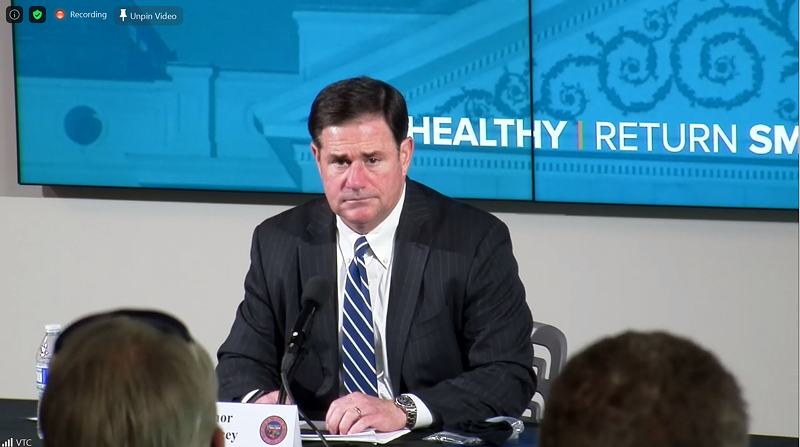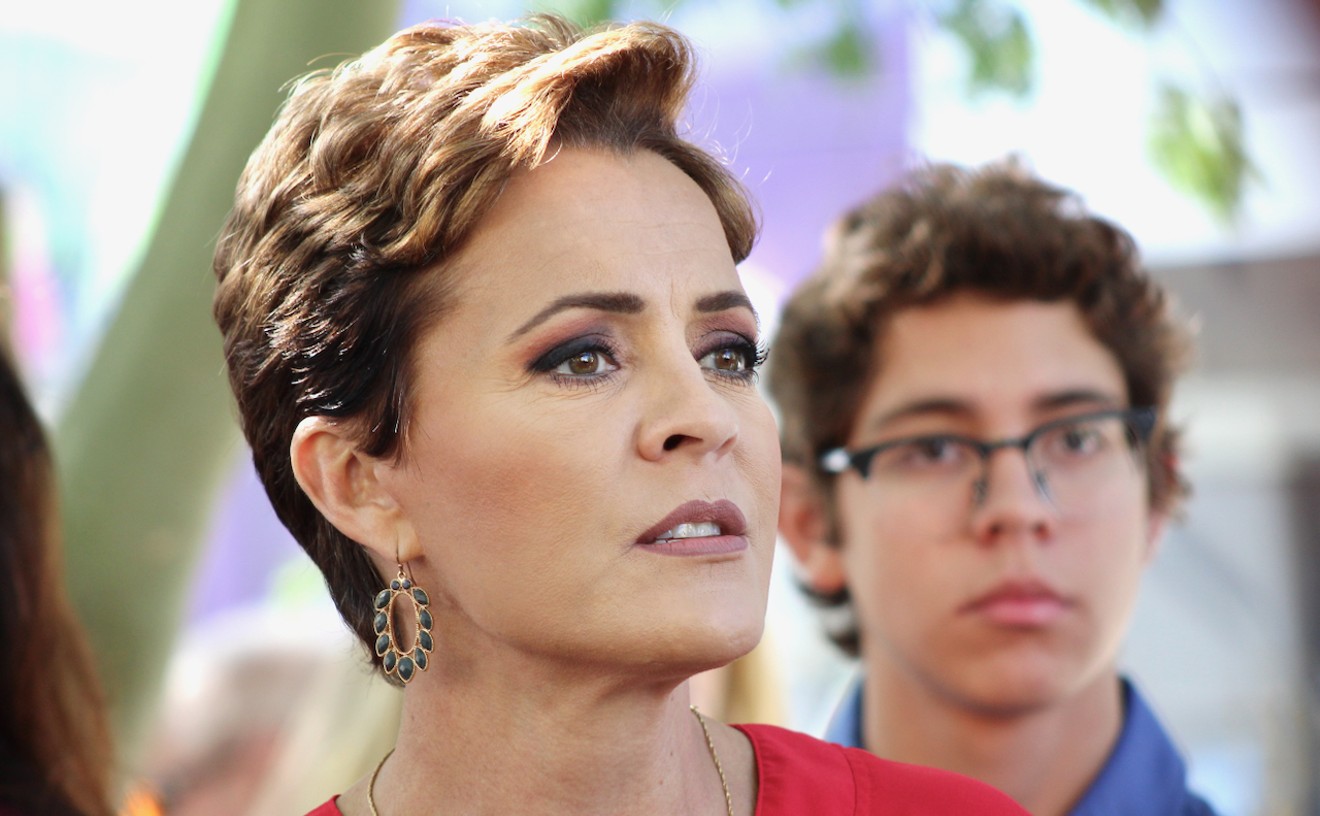Governor Doug Ducey has signed a group of bills that anti-police brutality advocates say severely undermine efforts to hold law enforcement accountable in Arizona.
Two of the bills, which Ducey signed into law late last week, target police oversight boards and investigations into misconduct. One bill, House Bill 2462, requires that members of civilian oversight boards have 80 hours of law enforcement training. Another piece of legislation, House Bill 2567, mandates that at least two-thirds of the voting members of any board investigating police misconduct be certified police officers who are from the same law enforcement agency as the officer who is being investigated.
The third bill, House Bill 2295, allows police officers to appeal decisions by prosecutors to place their names on the Brady list, a list of dishonest cops that prosecutors are supposed to maintain as a result of a 1963 U.S. Supreme Court ruling.
Ducey's move to sign the bills comes after last year's national reckoning with police brutality, protests in metro Phoenix, and a series of local law enforcement scandals, such as controversial police shootings and Phoenix police officers exchanging coins marked with white supremacist slogans.
Police reform advocates criticized Ducey's decision to sign the bills as out of step with the times and a direct attack on efforts to hold police accountable.
"These bills are going to gut an already broken system of police accountability in this state," said Jared Keenan, a staff attorney with the American Civil Liberties Union of Arizona. "Police are rarely held accountable already. This is just going to make it much less likely that they’re going to be held accountable in the future."
Keenan argued that the bill allowing officers to appeal their placement on the Brady list is a "solution to a problem that doesn't exist," citing Arizona prosecutors' current reluctance to seriously maintain Brady lists. He also said that the bills imposing restrictions on who can be on police oversight boards will "shut out" civilians from being involved in police oversight.
"When you stack oversight boards in this way, it’s not to make them fair and impartial, it’s to make them precisely the opposite," he said.
Local elected officials also weighed in after the bills were signed into law. On May 11, Phoenix Mayor Kate Gallego, Vice Mayor Carlos Garcia, and Councilmembers Yassamin Ansari, Laura Pastor, and Betty Guardado all signed on to a statement deriding the passage of the legislation. Those same council members had previously lost a 5-4 vote last November to set up the city's own police oversight branch, the Office of Accountability and Transparency. Ansari, who was recently sworn into office after winning the March election, told New Times last year that she strongly supports the office.
"It is clear that our state leaders are out of touch with the residents we serve. Governor Ducey’s signature on bills HB 2462, HB 2567, and HB 2295 effectively silences the voices of our constituents," they said in the statement. "Residents in our districts have asked time and time again for accountability from our police department. These bills are meant to undermine accountability and take away decision-making authority from cities. Nevertheless, we remain undeterred. In Phoenix we are ready to make the Office of Accountability and Transparency a reality."
On the same day that the liberal bloc of the council slammed the governor, Councilmember Sal DiCiccio, an ardent opponent of police reform efforts, issued his own statement praising the bills.
"The bills the Governor signed do nothing more than require anyone who is supposed to oversee the police department take classes and learn what the job actually entails," he said. "You would not want anybody who oversees medical doctors with absolutely no training in that field. The requirement of 80 hours of training is just common sense. What is not common sense is to be fighting this simple idea."
Lorna Romero, a spokesperson for the Phoenix Law Enforcement Association, wrote in an email that the organization "does not have an official position" on the bills and referred New Times to Joe Clure, executive director of the Arizona Police Association. Clure, who has supported police reform legislation in the past, did not respond to a request for comment.
While Ducey occasionally issues public statements explaining his rationale for signing or vetoing a given bill — he recently did this when he signed legislation that would boot some voters off the mail-in voting list — he stayed mostly quiet on these bills. The exception was for the Brady list bill: His office promoted a letter that Ducey sent to Secretary of State Katie Hobbs in which he wrote that the legislation "provides fairness and transparency" to officers who are slated to be added to the Brady list.
CJ Karamargin, a spokesperson for Ducey, did not respond to New Times' request for comment on the governor's decision to sign the bills.
[
{
"name": "Air - MediumRectangle - Inline Content - Mobile Display Size",
"component": "18478561",
"insertPoint": "2",
"requiredCountToDisplay": "2",
"watchElement": ".fdn-content-body",
"astAdList": [
{
"adType": "rectangle",
"displayTargets": "mobile"
}
]
},{
"name": "Editor Picks",
"component": "16759093",
"insertPoint": "4",
"requiredCountToDisplay": "1",
"watchElement": ".fdn-content-body",
"astAdList": [
{
"adType": "rectangle",
"displayTargets": "desktop|tablet"
},{
"adType": "rectangle",
"displayTargets": "desktop|tablet|mobile"
}
]
},{
"name": "Inline Links",
"component": "17980324",
"insertPoint": "8th",
"startingPoint": 8,
"requiredCountToDisplay": "7",
"maxInsertions": 25
},{
"name": "Air - MediumRectangle - Combo - Inline Content",
"component": "16759092",
"insertPoint": "8th",
"startingPoint": 8,
"requiredCountToDisplay": "7",
"maxInsertions": 25,
"watchElement": ".fdn-content-body",
"astAdList": [
{
"adType": "rectangle",
"displayTargets": "desktop|tablet"
},{
"adType": "rectangle",
"displayTargets": "desktop|tablet|mobile"
}
]
},{
"name": "Inline Links",
"component": "17980324",
"insertPoint": "8th",
"startingPoint": 12,
"requiredCountToDisplay": "11",
"maxInsertions": 24
},{
"name": "Air - Leaderboard Tower - Combo - Inline Content",
"component": "16759094",
"insertPoint": "8th",
"startingPoint": 12,
"requiredCountToDisplay": "11",
"maxInsertions": 24,
"watchElement": ".fdn-content-body",
"astAdList": [
{
"adType": "leaderboardInlineContent",
"displayTargets": "desktop|tablet"
},{
"adType": "tower",
"displayTargets": "mobile"
}
]
}
]










